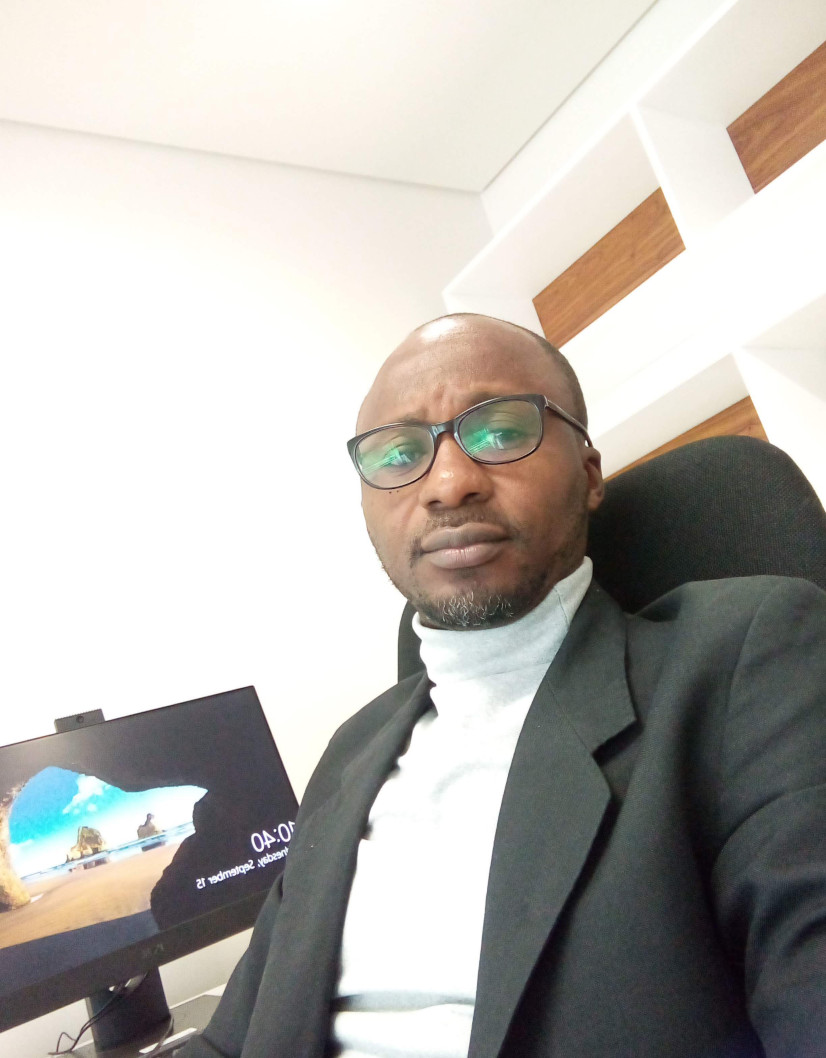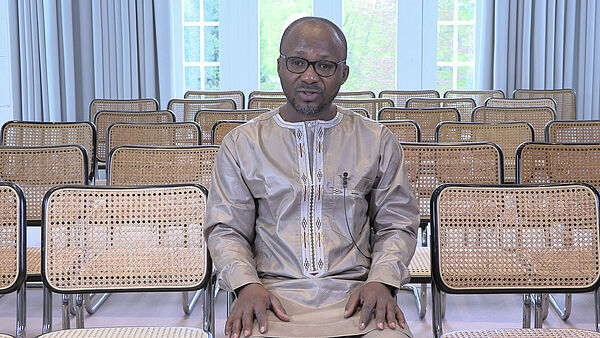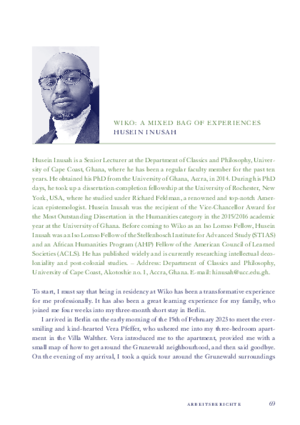
Husein Inusah, Ph.D.
Senior Lecturer in Philosophy
Universität Cape Coast
from February to April 2023
Born in 1984 in Worawora, Oti Region, Ghana
Studied Philosophy at the University of Ghana
Fellowship
Iso Lomso-Fellow
Arbeitsvorhaben
Decolonising Knowledge, Shaping Norms for Epistemic Diversity: The Perspective of African Intellectual Virtue Proverbs
Epistemic decolonisation is a project to liberate marginalised epistemologies of the South, especially that of Africa, and reposition them at the centre of intellectual discursive forms. This project examines the prospects of epistemic decolonisation in Africa within the context of globalisation. Some scholars in Africa are suspicious of the effects of globalisation on the call to decolonise knowledge, citing the dangers of epistemicide (loss of knowledge diversity). Others support globalisation, citing its ideals for scholarly collaboration and cross-cultural fertilization of ideas between the Global North and the South. This has resulted in unending controversy often motivating the tension between Afrocentrists’ and neo-Afrocentrists’ construal of the clamour for epistemic decolonisation. This project contributes to this debate by exploring Africa’s potential to decolonise knowledge through an epistemic multiculturalist paradigm without eroding the value of African indigenous knowledge systems. The project draws on the intellectual virtue of African (specifically Akan and Yoruba) proverbs and involves analyses of the selected proverbs, field interviews, and an extensive review of literature guided by the theories of social ontology and pluriversality to explore epistemic multiculturalism as an effective means of decolonising knowledge in Africa. It also deploys insights derived from the intellectual virtue of African proverbs to design an instructional model for teaching the virtues of epistemic multiculturalism to promote global futures in which the notion of epistemic monoculture is replaced with epistemic multiculturalism. The significance of this project is diverse. In the first place, it goes beyond just listing African proverbs and focuses on the intellectualisation of African proverbs designed to shape culture from an African perspective and foster epistemic plurality to bridge the gulf between Africa and other parts of the world in terms of the production and dissemination of knowledge. The intended legacy of this project is its use of the researcher’s oral resources to promote epistemic multiculturalism and decolonisation in Africa.Recommended Reading
Inusah, Husein (2020). “Consensus as Model for Re-conceptualizing African Epistemology.” In Deciding in Unison: Themes in Consensual Democracy in Africa, edited by Emmanuel Ifeanyi Ani and Edwin Etieyibo, 19–34. Wilmington, DE: Vernon Press.
Inusah, Husein, and Michael Segbefia (2021). “Intellectual Virtues of Indige¬nous African Wisdom: The Perspectives of Akan Proverbs.” In Being and Becoming African as a Permanent Work in Progress: Inspiration from Chinua Achebe’s Proverbs, edited by Francis B. Nyamnjoh, Patrick Nwosu, and Hassan M. Yosimbom, 335–362. Bamenda: Langaa RPCIG.
Inusah, Husein (2022). “Who Is Afraid of Epistemic Relativism? Disentangling African Philosophy from the ‘Universalist’ Entrapment.” In African Potentials: Bricolage, Incompleteness and Lifeness, edited by Itaru Ohta, Francis B. Nyamnjoh, and Motoji Matsuda, 29–50. Bamenda: Langaa RPCIG.
Kolloquium, 04.05.2023
Decolonizing Intellectual Decoloniality: Insights from African (Akan) Proverbs
Interest is currently resurging in the clamor for intellectual decoloniality among scholars of decolonial studies in Africa. This renewed interest has culminated in the design of two main strategies for addressing the question of intellectual decolonization in Africa. One of the strategies involves addressing intellectual decolonization as a form of expressive culture by depicting African indigenous knowledge systems embedded in ancient African arts, architecture, and oral resources (i.e., knowledge systems that were supplanted by colonialism) as a way of reconstructing African civilizations of antiquity. The other strategy, through philosophical reflection, advocates what ought to be considered a successful strategy for intellectual decolonization in Africa. Within this second perspective, there are two main views. One is the suggestion that epistemically marginalized communities ought to delink from Eurocentric epistemologies as a plan of action for achieving successful intellectual decolonization. The other is the suggestion that intellectual decolonization ought to involve epistemic pluralism in which all epistemologies are allowed to flourish. In my presentation, I try to combine both strategies to articulate what I believe should constitute the appropriate conception of intellectual decolonization in Africa. I achieve this by deploying African (specifically Akan) proverbs (as a form of expressive culture) to demonstrate the significance of African oral resources such as proverbs to the question of intellectual decoloniality in Africa and also to draw insights from these proverbs to leverage the prospects of intellectual decolonization in Africa (which also includes suggesting what intellectual decolonization ought to imply).
Publikationen aus der Fellowbibliothek
Inusah, Husein (London, 2023)
Inusah, Husein (Bamenda, Cameroun, 2021)
Intellectual virtues of indigenous African wisdom : the perspectives of Akan proverbs
Inusah, Husein (Wilmington, Delaware, 2020)
Consensus as model for re-conceptualizing African epistemology

